WryDing
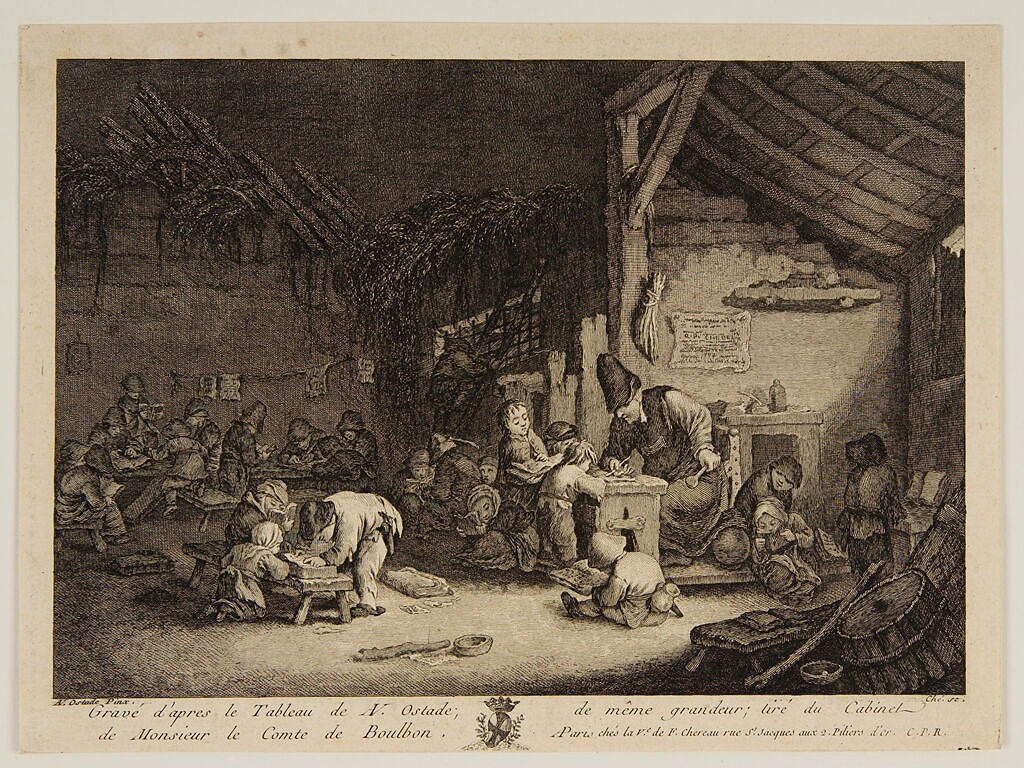
Pierre-Quentin Chedel:
Le Maître d'école [Writing School ] (18th century)
"That's how I use the English language."
I cannot rightfully claim to feel proud of my profession. Indeed, I cannot even rightfully proclaim to have a profession. I fancy myself a writer. I trade in writing or WryDing, as I might more accurately describe it. It can't qualify as a profession because it has never really amounted to anything. It's never translated into something even vaguely resembling a living. Over my lifetime, my WryDing has produced a deficit, a record kept exclusively in red ink, revenue never once exceeding expenses. Were it a business, it would have been shuttered ages ago, and its proprietor would have shuffled off to some other field or wisely retired. The usual rules for comportment, investment strategies, and civil niceties don't seem to apply. A terribly narrow set of general guidelines apply instead: Keep WryDing.
Should a day slip by without at least a little transcribing, identity crumbles, for WryDing demands full attention.
SuperImpositioning
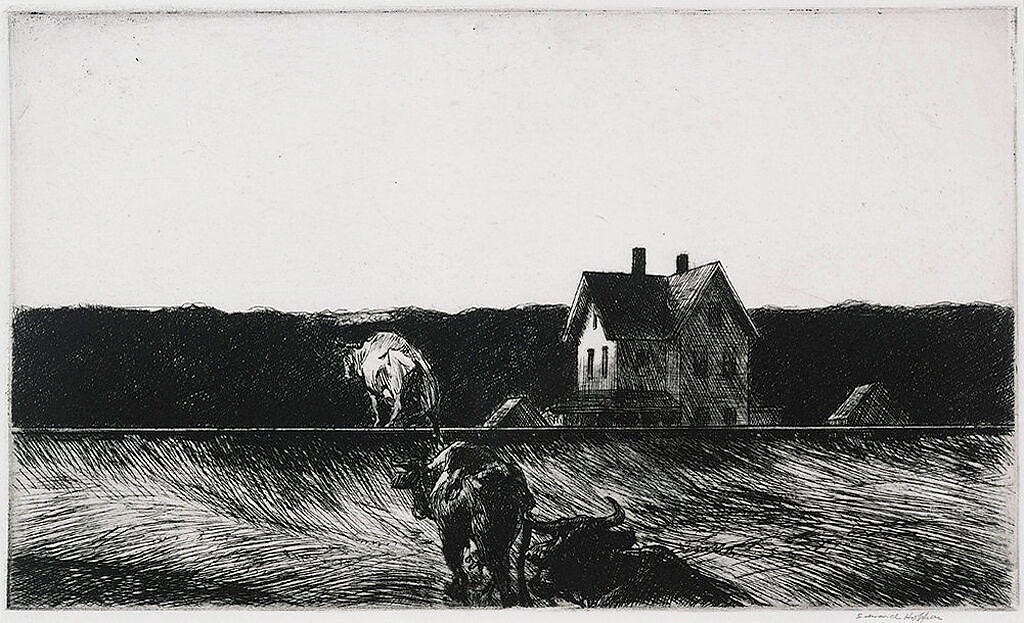
Edward Hopper: American Landscape (1920)
"Old campaigners never die …"
A point comes in every political campaign when the election process enters the quantum realm, most prominently during that excruciatingly brief period when both candidates have won. After the mail-in ballots drop but before votes are counted, Schrödinger manages the ballot box. That box holds both victory and defeat without definitively disclosing which outcome will ultimately manifest. There's nothing a candidate or an electorate can do to influence an outcome that's already moved out of their hands. The results exist in superposition, both-and rather than either-or. However, by the evening of election day, their quantum state will finally resolve after a frustrating fortnight of SuperImpositioning, the supreme imposition not knowing induces. The Muse has fliers remaining but little means to influence voters now. Many already voted, one way or another, and those that haven't voted become increasingly less influenceable, especially since it's an off-year election featuring only local races. Ballot return rates have historically measured in the low two digits regardless, yielding an unpredictable race.
The die cast but yet to land, out of hand but not yet settled and countable.
HighCrimes
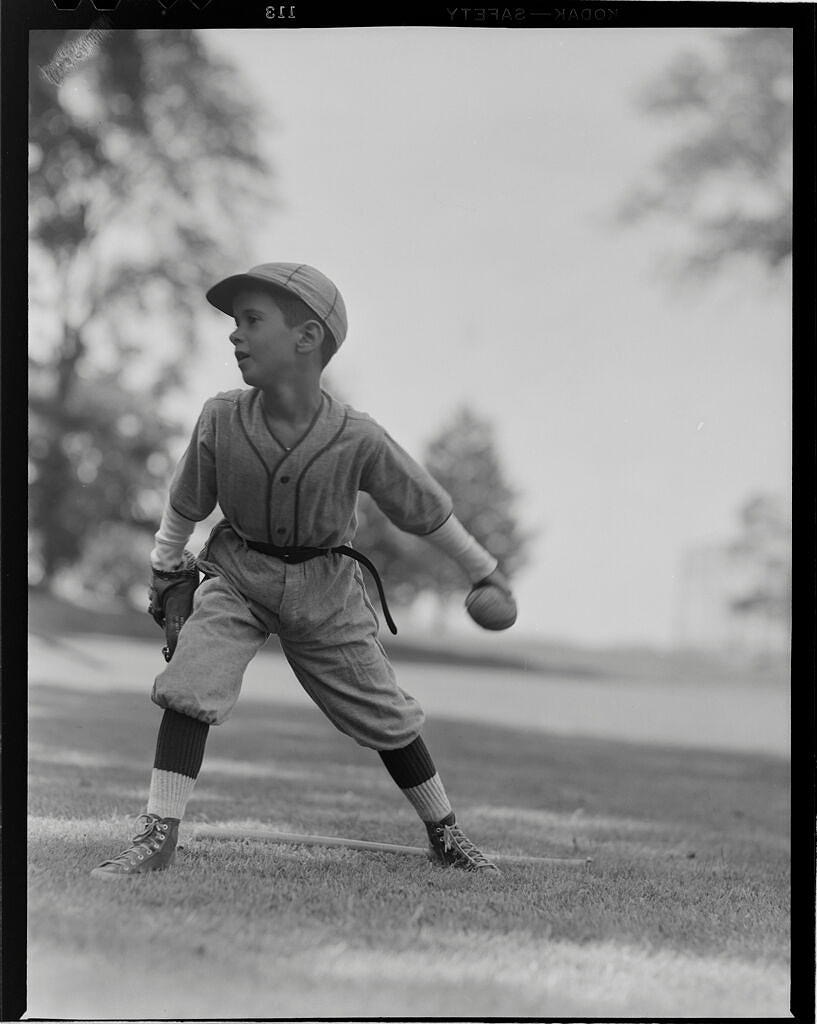
Lucian and Mary Brown:
Untitled [little boy throwing baseball] (c. 1950)
"I do not believe in anything like learning to forget some things."
Premeditation aside, the worst crimes tend to be crimes of inadvertency. One backs into these infractions without malign intentions, often with innocent misconceptions. These crimes seem less committed than incurred. They're usually wrong-place-wrong-time shortfalls, actions that would have never happened save for convergent conditions. We walk on someone else's territory not to trespass but simply in passing. We might not even notice at first. Another might finally clue us in, or we clue ourselves in well after the fact. However we learn about our crime, we might well always remember it. Punishment might become a life-long haunting remembrance of the event, something no amount of penance or forgiveness will ever adequately compensate for committing or erase the accompanying sensations. We wound another by backing our bus over them without noticing.
These sins can never be undone.
OddConvergences
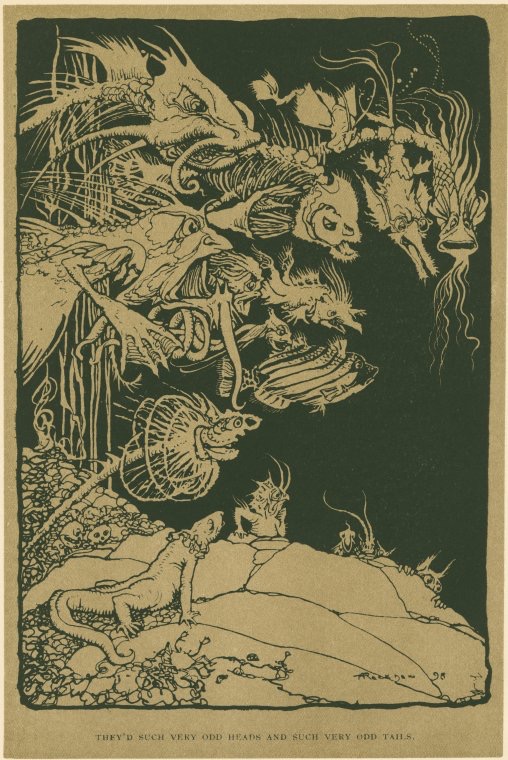
Arthur Rackham:
They'd such very odd heads and such very odd tails.
(1911)
" … just happened to be passing …"
One iron-clad rule I should never disobey pertains to disclosing the content of one of my PureSchmaltz Friday Zoom Chats. I began convening these weekly sessions early in the pandemic and continue them today. I originally designated them as dialogues without specific agenda, so they tend to contain whatever seems to need saying in that moment. I deliberately avoid recording the proceedings because I intend them to be the sort of conversation where you must have been there to understand whatever happened. Not to paint them too awfully mysterious, they feature the usual insightful comments about the weather interspersed with genuine genius. One must pay close attention some weeks to catch the genius, but it always emerges. I leave these sessions with a renewed appreciation of the brilliance lurking within everyday conversation. Something always happens.
To violate my iron-clad rule about my Zoom Chats, one of the participants said precisely that: Something Always Happens, in response to my reflection on my earlier posting, Prabability, where I recounted the story of The Muse discovering that the gentleman seated next to her at a banquet was the nephew of her grade school bus driver, an OddConvergence.
Inanity
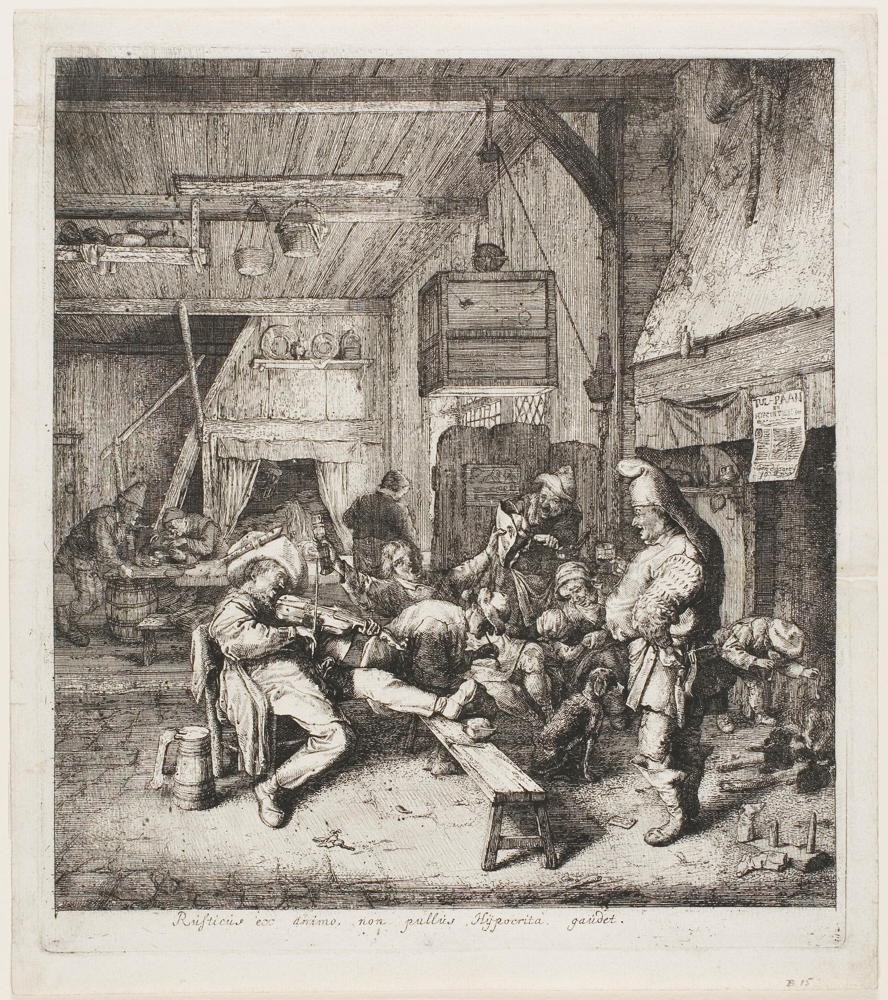
Cornelis Dusart:
Violin Player Seated in the Inn (1685)
" … we washed up on this shore rather than some other."
My work seems either inane, insane, or both, probably both. It exemplifies doing the same thing and expecting different results, for I seem to follow the same damned process whatever I do. Not precisely the same steps, but viewed from a certain distance or altitude, it includes similar stages: from not knowing to finally dispatching, the flow varies little. Sure, the results seem different every time. This story never existed before this moment and will never appear in anything near to this form again. I do not plagiarize from myself, not yet, anyway. However, I can imagine a day when, steadfastly focusing on my rut, I invent an utterly unoriginal story, a mimeographed copy of some earlier one. This could happen, if only due to the similarities in my process.
Creativity turns out to be different from what it promised.
Writing Summary For The Week Ending 10/26/2023
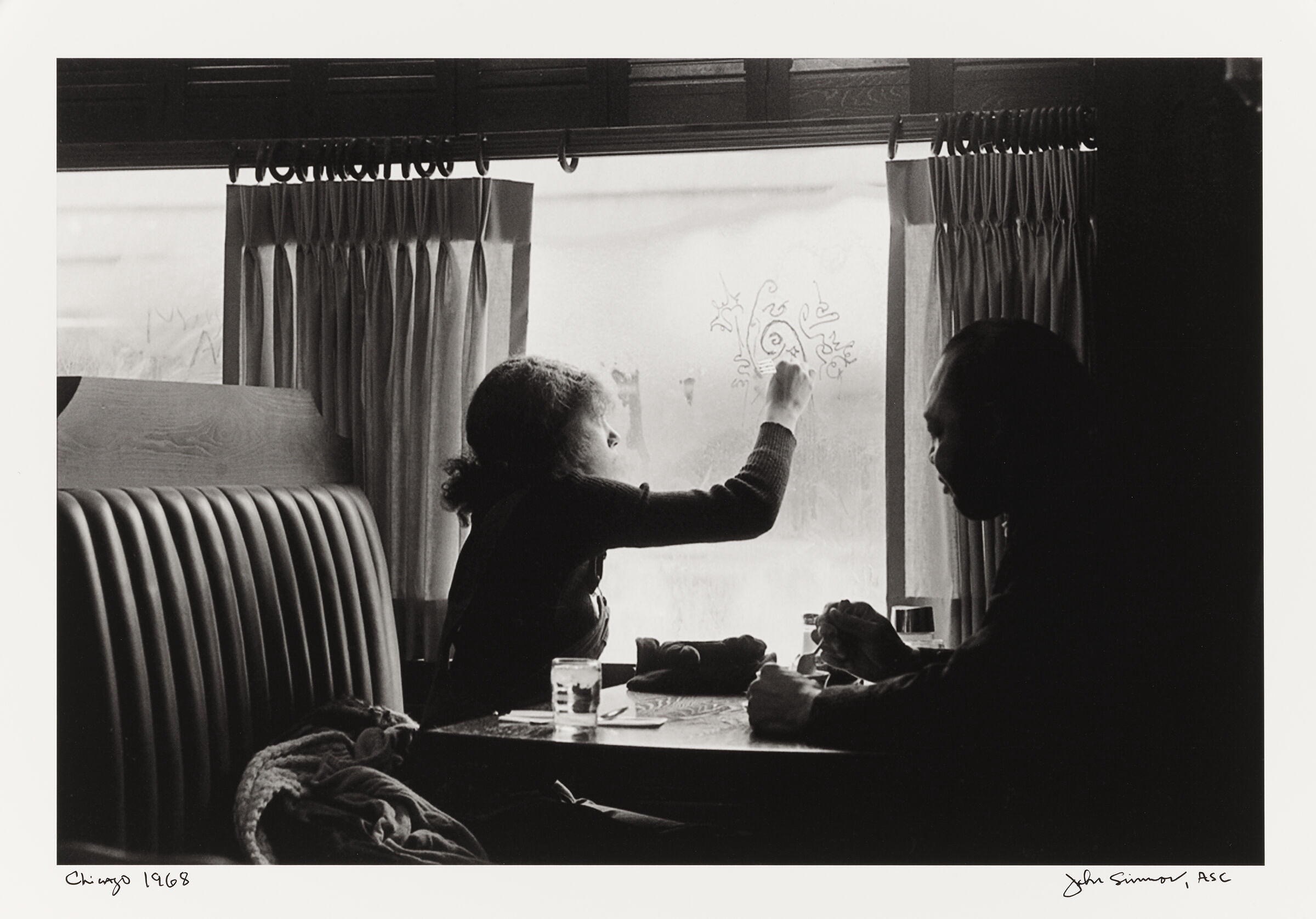
John Simmons: Window Writing, Chicago (1969)
Odds Might Not Matter
At times in my past, I still believed that I might get away with something. I suspected that I was only fooling myself but still engaged as if I might be wrong, that my life might be crafted for a song without hard labor, without undue or undeserved suffering. I found no convenient backdoor to anything, though, because stuff just happens. I'm uncertain if I believe in karma, for I've seen too many innocents visited with undeserved curses. I prefer to believe in a benevolent God, though I suspect she's at best indifferent. I can't not care deeply, though, often more for others than for myself. After almost a lifetime of surprises, I've practically lost the need to succeed. I do not expect my predictions to come true. I don't buy lottery tickets, either. I write for reasons other than pleasing anyone, often even myself. I might write to let an indifferent God know I was here, producing against insurmountable odds. The odds might not matter if I play to achieve something other than winning something. This is, after all, the letting go season.
TheTux
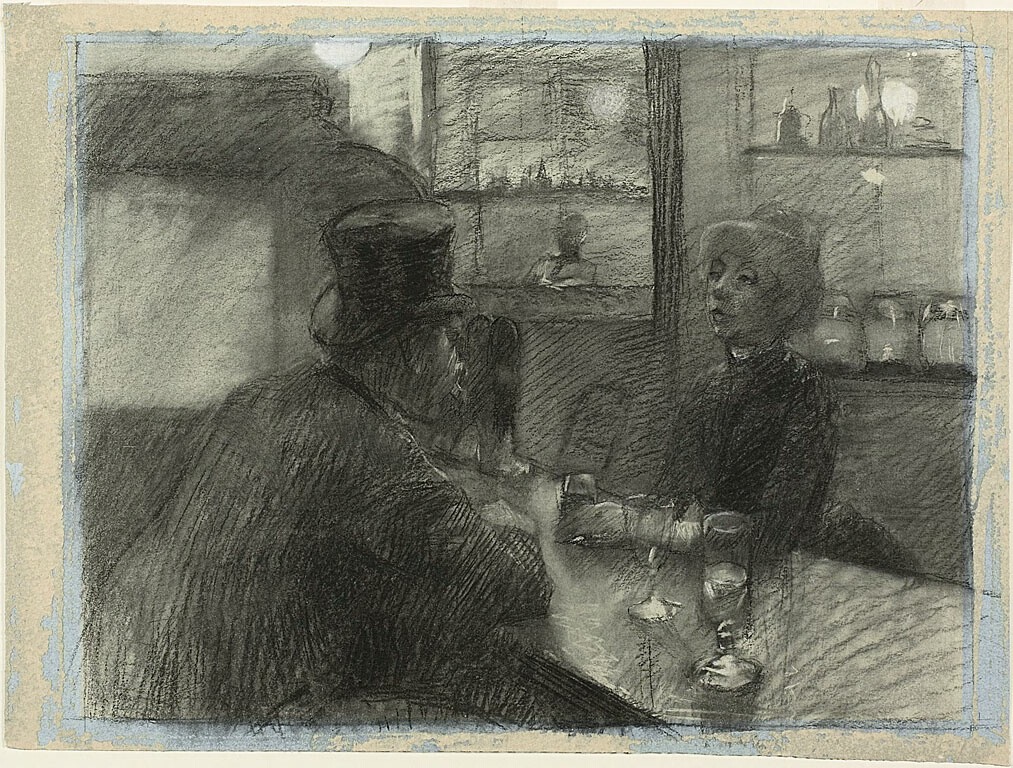
Henri de Toulouse-Lautrec:
Bar of the Café of the rue de Rome (c. 1886)
"The tiny moments in tiny rooms might make all the difference."
The Muse and I are not regulars at any bar and grill, though we almost know our way around that society; she learned at Marskies, a tiny South Dakota bar in the half-horse town she grew up just outside of. I never learned but am still learning, entering every bar wary and uncertain of the rules of engagement. I slink around half-invisible as if my fake ID teetered on the edge of discovery and I was tarnishing my reputation. In some places, especially tiny towns, the bar might be the only retail establishment in the city. So it is with TheTux, a social club center of the universe place in tiny Prescott, Washington, population 377. No tuxedo has likely ever graced this space. This town represents a considerable portion of the county, though. Our canny candidate understood she dared not avoid it, so she asked Doug, the local Democratic Precinct Committee Officer, if he might introduce her. He invited us to an evening at TheTux, specifically Wednesday Taco Night, which qualifies as a weekly local celebration.
The tacos are crap, two bucks a pop, and well worth, at best, a quarter of that.
EmptyAir
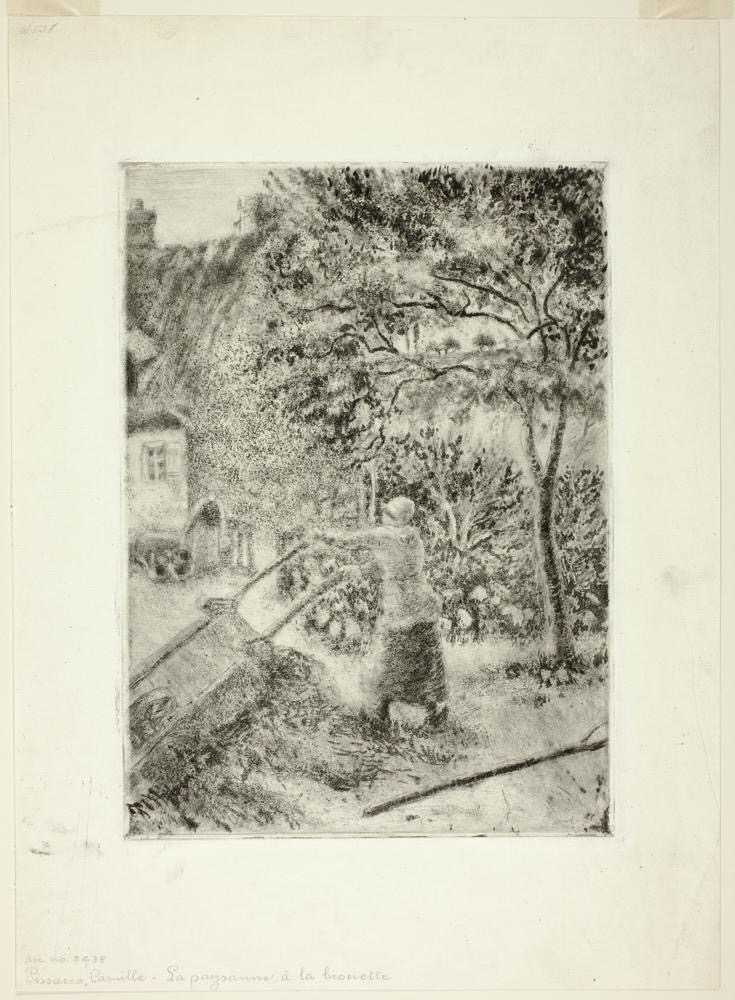
Camille Pissarro:
Woman Emptying a Wheelbarrow (1880)
"The hunter dreams of tomorrow's hunt …"
I had been steadily canvassing through a difficult precinct—streets with gravel verges instead of sidewalks, long distances between porches—and settling into the by-then familiar sweaty collar and yoke when The Muse called. She'd finished her video call and was ready to meet up with me to finish canvassing this latest Turf. I disclosed my location and predicted where I'd be fifteen minutes later before continuing to drop campaign literature on those increasingly rural porches. She arrived on time and parked in a turnout so we could confer. As usual, the software misbehaved, complicating our synching up. I proposed that she drive around to those places I'd passed up because the houses were too far from the main road, and she couldn't seem to find which houses I referred to. In frustration, I pleaded with her to at least deliver a sign to one homeowner who'd requested one. She needed literature I couldn't spare, so I passed the key to the other car where I'd left my excess. She drove away in some frustration, and I continued dropping fliers.
A mile later, she showed up again, explaining that her mailing had hit mailboxes that morning, so that canvassing might be too much information that day.
ButtoningDown
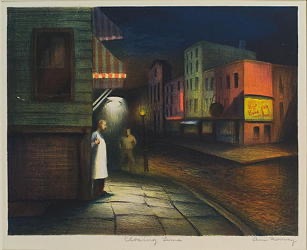
Ann Nooney: Closing time (1937-1942)
"I wonder if he'll ever discover the secret."
Eventually, every inevitable comes, every denial fails, and time slinks on. Even the once-endless Summer, gone to Autumn over a month ago, also ends. The first frost arrives with the news of the first frost's arrival, for it sucks the final sense that we might make it to Thanksgiving without regrets, without forfeiting anything. The slow Summer builds, gardens finally grown to blossom and fruit still look as though they might last forever. Some neighbors pre-emptively pull their impatiens, geraniums, and petunias, assassinating offspring to deny the assassin the satisfaction of freezing them out. I'll collect our corpses once they're well-wilted and ready for composting.
The Muse pulled her summer garden, cucumbers, tomatoes, and peppers, picked over and uprooted.
Insensibility
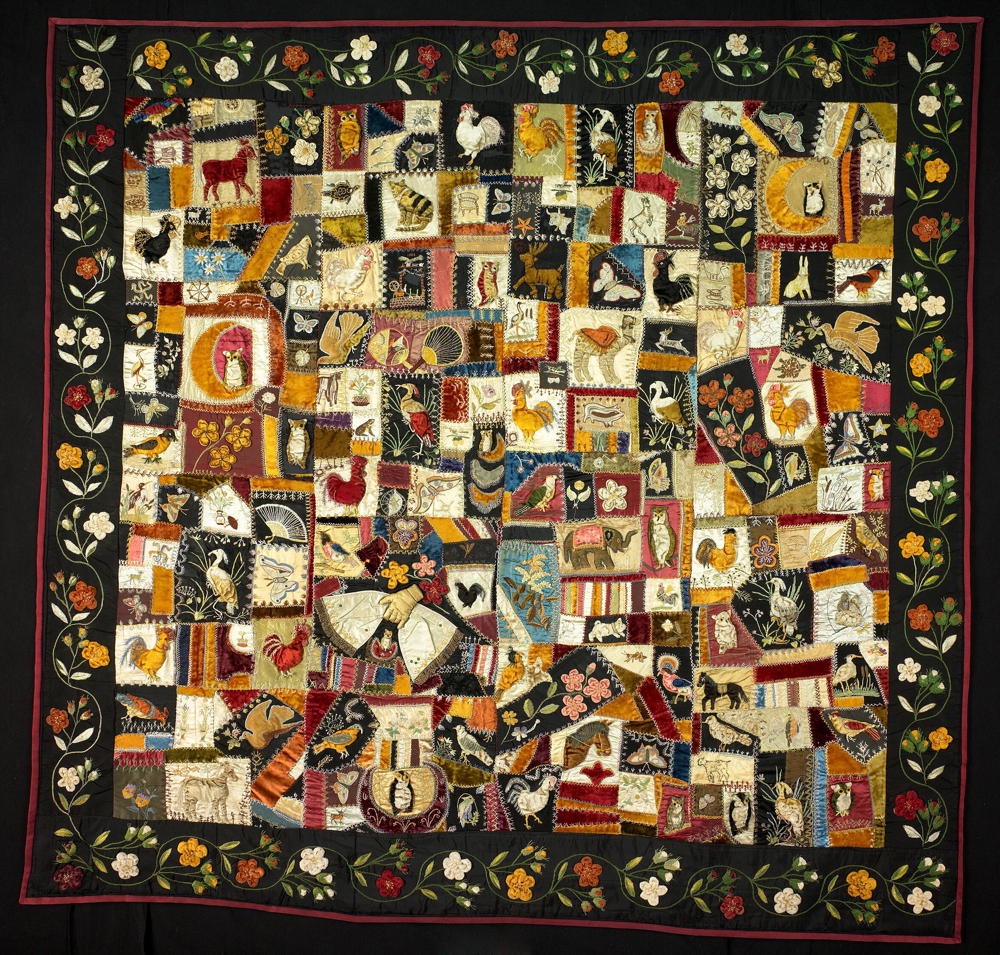
Designed and executed by Florence Elizabeth Marvin:
Crazy Quilt with Animals (1886)
" … praying for deliverance."
We each possess gifts more or less unique to us. None of us were produced with cookie cutters. We're each different and different in non-obvious ways. We look deceptively similar, which can confuse even the most patient and otherwise understanding, but we seem to be most deceptively dissimilar. Diversity, lately the hobgoblin of conservative commentators, might be inescapable and uniformity unlikely regardless of how anyone might otherwise insist. We are different.
Try to design a one-size-fits-all experience, and you'll most likely fail.
Prabability
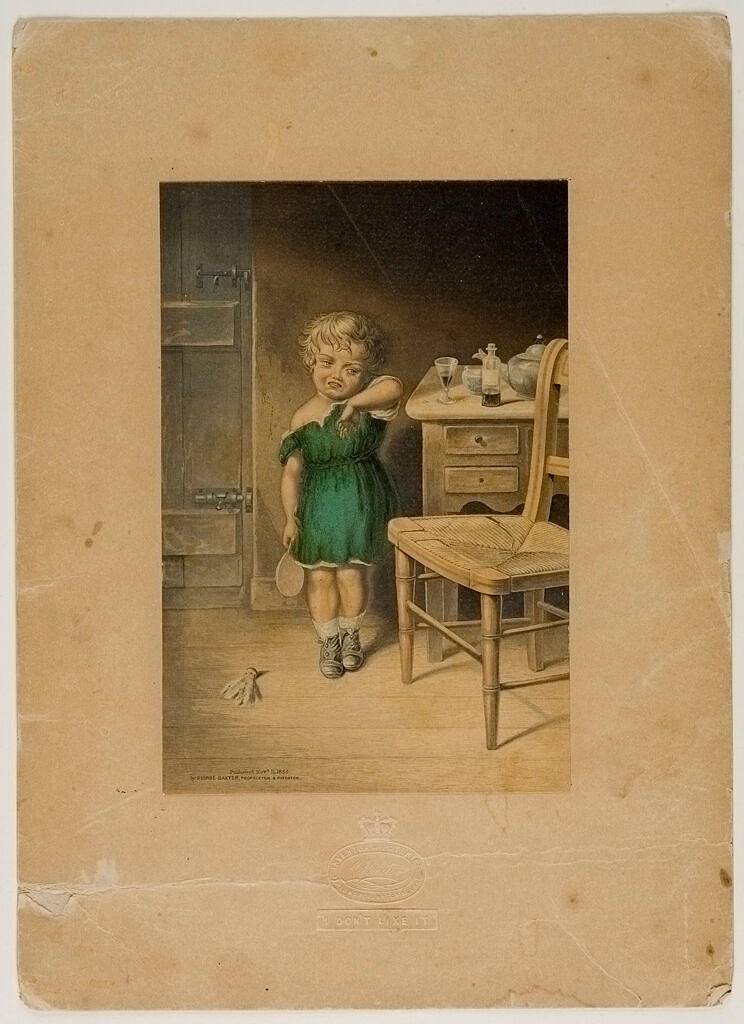
George Baxter: I Don't Like It! (19th century)
We parse our world with probabilities. We ask, "What was the likelihood?" without considering whether we're dealing with a situation where probability might rule, for its domain does not seem as universal or infinite on close investigation as it initially might. Not every event falls beneath the governance of the law of large numbers. Many carry an essentially zero likelihood of ever occurring, yet they still somehow manage to manifest. While doubtless only partially purposeful, our development probably also doesn't qualify as random, either. The likelihood of me becoming who I am today was zero when I was born, but then nobody could foresee very much of anything that would be coming, so one might wonder what sort of fiction anyone could have been predicting.
The unlikely seems commonplace.
LapCat
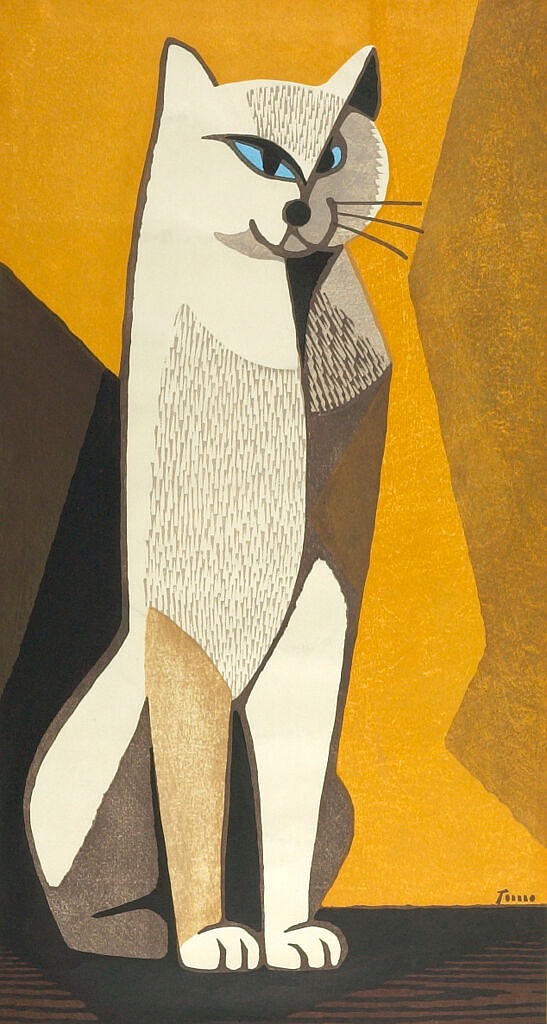
Inagaki Tomoo: Seated Cat (Shōwa period, 1926-1989)
Harvard Art Museums/Arthur M. Sackler Museum, Bequest of C. Adrian Rübel
" … get on with my morning. "
Max has grown into the LapCat I'd once imagined he might become. When trying out a potential new cat member of the family, I was deliberately very picky. My memories of prior cats colored my judgment, turning every candidate into an unlikely companion. Their coloring seemed wrong, or their temperament suspect. Of course, it should have been impossible to tell if a six-month-old kitten might grow into a tolerable companion, but I persisted in my gruff assessments. The Muse and the visiting Grand Otter returned from a visit to the cat shelter insisting that they'd found the replacement I had been seeking, so at their invitation, I accompanied them back to the place to test drive this latest contestant.
He was the right color and perhaps the proper temperament.
WritingSummary For The Week Ending 10/19/2023
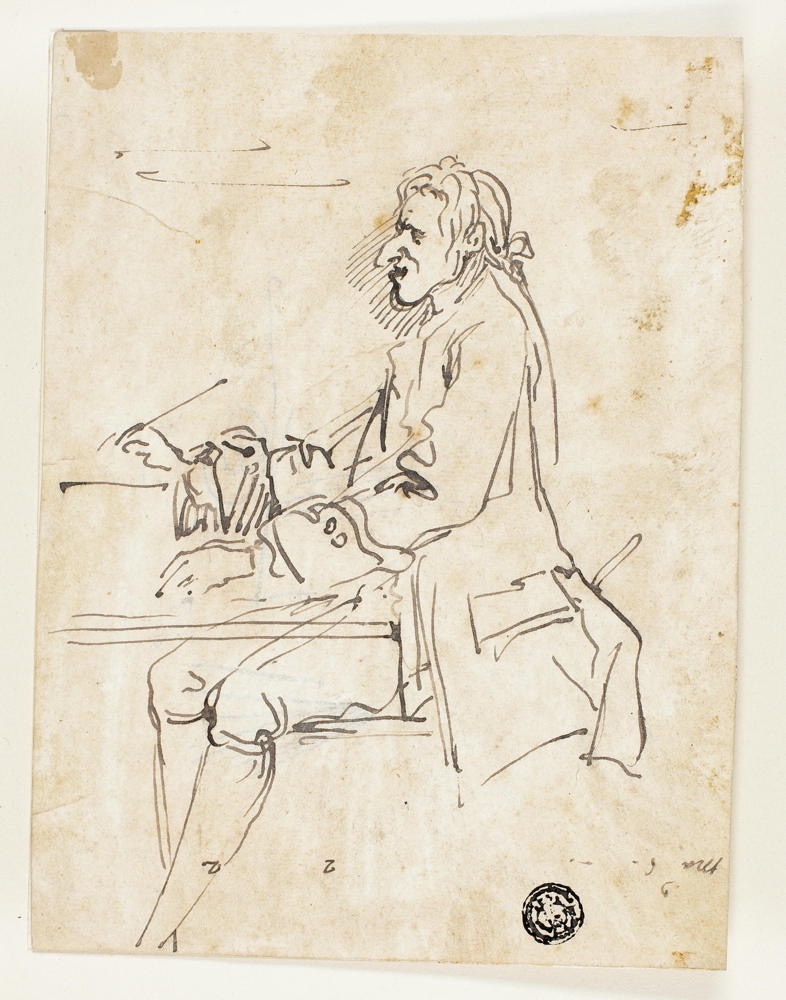
Carlo Marchionni or Pier Leone Ghezzi:
Caricature of Man Writing (n.d.)
A Familiar Place I Should Feel More Accustomed To
I might have finally run out of time. I'd felt a certain draining of my resources as if mice had invisibly invaded my pantry and begun quietly consuming my commodities. I hadn't noticed any particular shortages, though. The flour, sugar, and other stores seemed unviolated, yet I continued feeling shorted. This sense might have been pre-emptive, a feeling intended to prepare myself for a future loss, just as if such preemption were possible. I engage in many just-as-ifs these days. My days absolutely depend upon just this sort of speculation. I am predominantly a faith-based initiative. I move forward on rumors more often than facts. I never feel very confident about anything, even in retrospect. I do know, though, that the sun's arriving later every morning and leaving inexorably earlier every evening, leaving me in the dark, a familiar place I should feel more accustomed to than I seem.
Amaficient
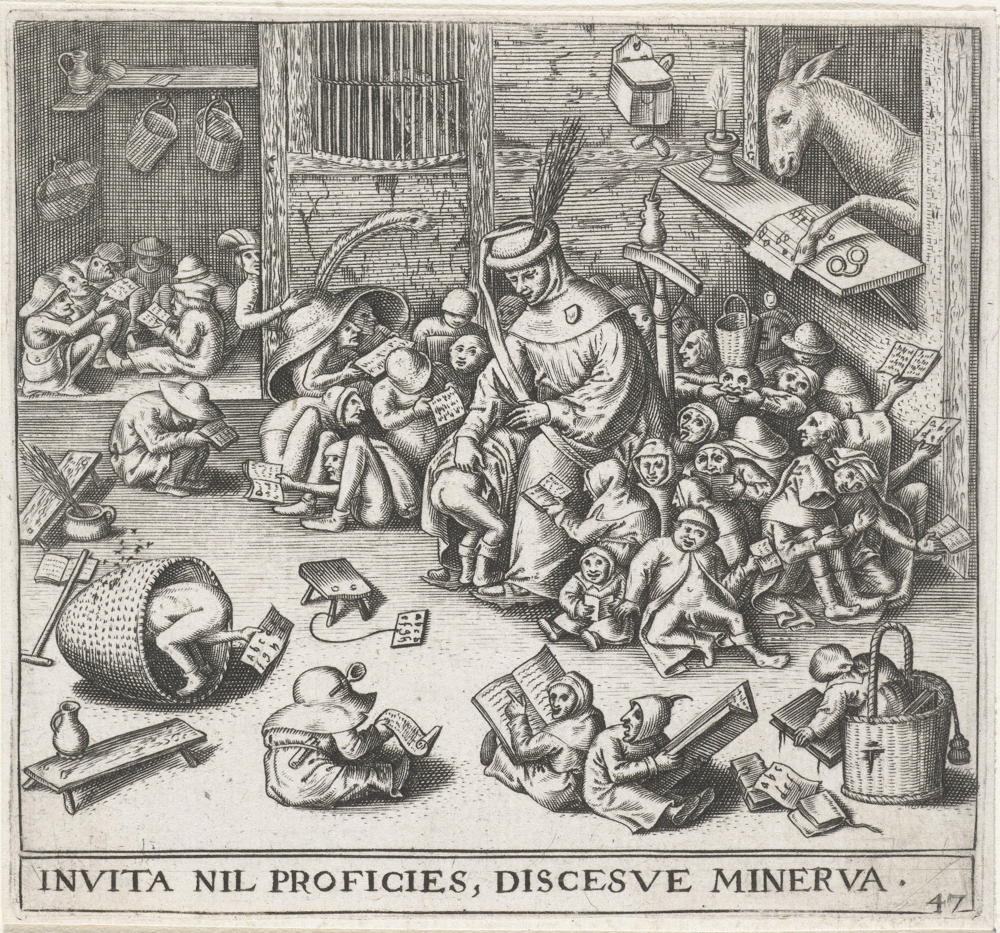
Johann Theodor de Bry:
De ezel op school [The Donkey At School] (1596)
"I never come close to producing my best until I leave the paycheck out of the effort."
In this culture, my culture, we speak glowingly of The Professional, as if it occupied the highest rung of some hierarchy of goodness. Amateur might be just fine but it's never the quality a professional might produce, as if making money, getting paid for performing, somehow sanctifies an effort. Interesting how most of the effort expended in this culture cannot be properly classified as professional. We cede our most important work to amateurs.
I was once a professional.
Laming
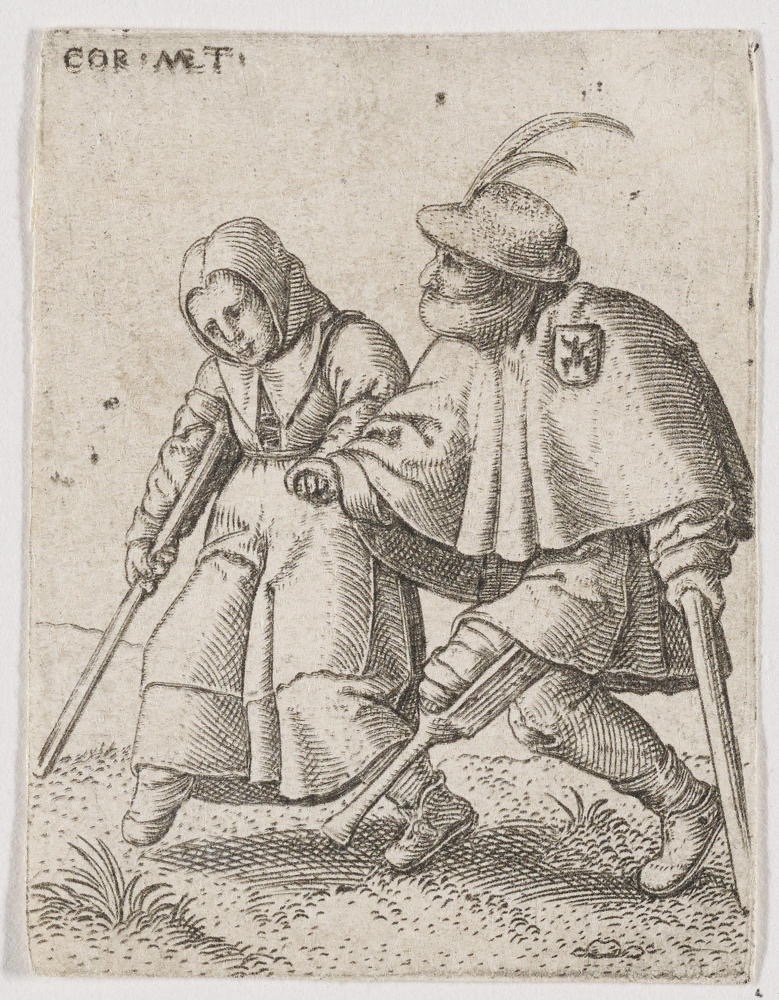
Cornelis Massijs: The Lame Dancers,
from La danse des estropiés, Plate 10 (1538)
" … bare trees and I will still be standing."
Every step I take might advance me, but it also somewhat hobbles me, for I remain far from an infinite resource. I experience wear and tear and might never fully recover from any exertion. I poison myself as I nourish myself, this dichotomy apparently indivisible. I can't have one without the other. This fact comes into sharper focus whenever I exert extraordinary effort. Though I do not immediately recognize this shift, my limits might have receded to well beneath my earlier edges. I remain focused on my goal while imagining employing the same old machinery. I seem increasingly an imaginary character, fueled by fiction and grounded by my creepingly prominent limitations. I can still stretch to excess, but only if I'm willing to pay the price. I’m almost always willing.
I hope to never engage with cautious circumspection.
Foreboding

François Bonvin: Woman at the Spinet (1860)
" … before conceding that I would not succeed."
Fall predictably brings Foreboding, for we all know what's coming. We do not know—we never know—precisely when, but we understand what's coming next. Summer, which seemed permanent while it lasted, left without notice. I always hold my faith in Summer until it's been well and truly betrayed by a chill wind or days of rain. I never believe in Fall, for it seems to move unreliably, some days hot and some days almost cold, an outlier day nearly eighty, an easily ignored forty early one morning. My sweatshirts creep back into my wardrobe. Socks seem necessary again. As I said, I know where this is going and feel powerless to suppress it.
As usual, my work's backed up.
MightyMachine
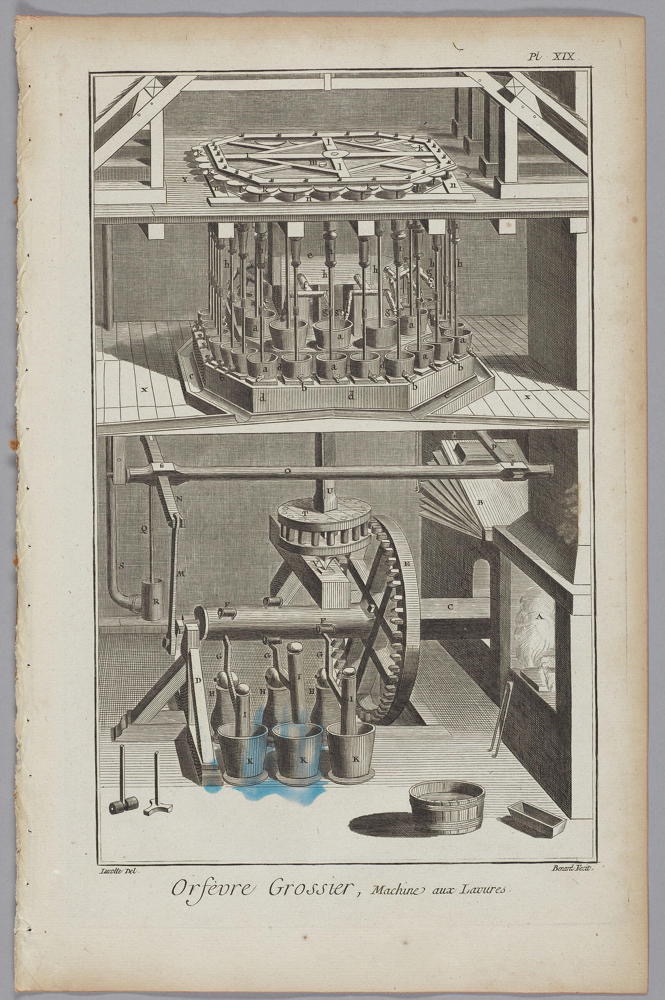
Robert Bénard: Goldsmiths' Cast Machine (1771)
"It was always destined to become a one-and-done contraption."
An old Pennsylvania Dutch caution insists we're "too late schmart." Smarts emerge only after stupidity tuckers out, usually much nearer the end than any beginning. Whenever we set about trying to accomplish something, we first set about learning how we might achieve that desired end. We might spend much more than half the time we've allotted to accomplishing, quite literally not accomplishing, making mistakes and course correcting. We might not finally stumble upon the magic combination enabling accomplishing until very near the end of the pursuit. Once accomplished, the by then MightyMachine we assembled to achieve our end probably becomes moot. We seldom find ourselves in a position to accomplish the same thing again.
Our learnings might go into cold storage until another related effort begins, but even then, considerable adaptation will be required before those past learnings find fresh relevance.
BibleStudy

Rembrandt van Rijn: Woman Reading (1634)
"Please have mercy on the rest of us first!"
The Muse and I were invited to a dinner party of sorts. I say "of sorts" because the premise seemed suspicious since it was organized as a kind of lottery where somebody other than the host decided who would attend. That somebody was a group The Muse belongs to that also musters an annual used book sale, which has become a standing ritual on the local calendar with collection boxes prominently positioned throughout the town. The Muse sometimes disappears for an afternoon, claiming that she's going to "sort books," a good enough excuse and better than some. I anticipate these gatherings as if they were teeth cleanings. It's not that I'm anti-social. I just prefer to limit my social exposure to well south of any lottery.
We had met our host for the evening at an earlier ginned-up gathering, and I remembered her as a most unusual dinner companion.
RandomWalking
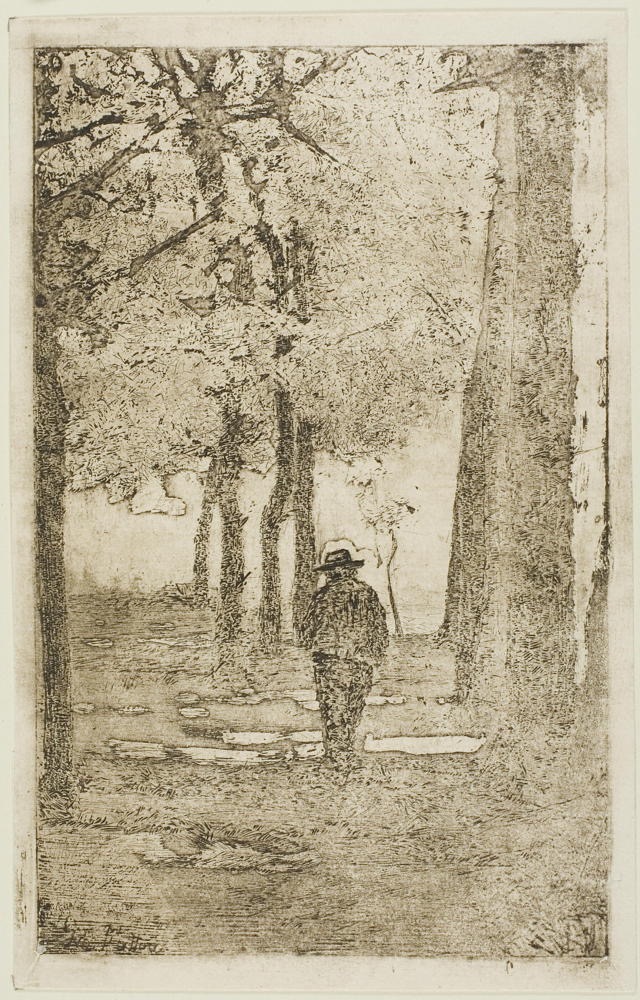
Giovanni Fattori: Wooded Walk with Figure (n.d.)
"Discovery better imprints than simple direction ever does."
The Muse uses an app to guide her volunteers in performing literature drops. A Literature Drop refers to a distinct kind of Canvassing, the purpose of which is not to contact anybody but to leave a piece of campaign literature where a resident can find it and get influenced. Lit Drops can cover an entire precinct in an afternoon, while door knocking and full-out Canvassing take much longer and might even prove less effective because of the reduced number of houses full-out Canvassing can cover. This app guiding the volunteers does not prescribe a path through a precinct. Instead, it presents a picture of the target houses arrayed on a map. Since precincts are essentially arbitrary constructions devised for purposes other than creating an easily walked-through route, the volunteer must concoct their path, which will inevitably seem to make little sense to any outside observer, often even the volunteer.
Pattern seeker that I have always been, I search each precinct map for a path of, if not least resistance, then at least one demanding minimum effort.
OffDay
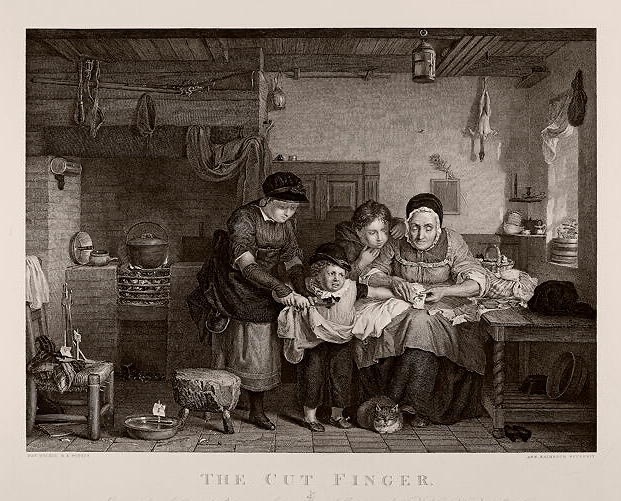
Abraham Raimbach: Cut Finger ((19th century)
" … gone before they began."
In days past, people grieved by wearing a black armband, a universally recognized indicator that the wearer might not be up for normal activities of daily living. Chit-chat could wait. So could further trouble. People understood to give the mourner adequate space to feel crazy for a while in the interests of maintaining some tolerable level of sanity in society. Now, we've grown so damned casual that we no longer observe such rituals, so the typical mourner hasn't a clue what to do. Of course, the black armband wearer never had a clue what to do, either. That might have been the whole point of observing the ritual. The guidebook said, "When someone dies and leaves you without a clue what to do, wear a black armband until your head clears." It also insisted, "When encountering someone wearing a black armband, express no more than your heartfelt condolences. Avoid chatter." These days, one experiences an OffDay instead.
An OffDay seems different than a day off.
WritingSummary For The Week Ending 10/12/2023
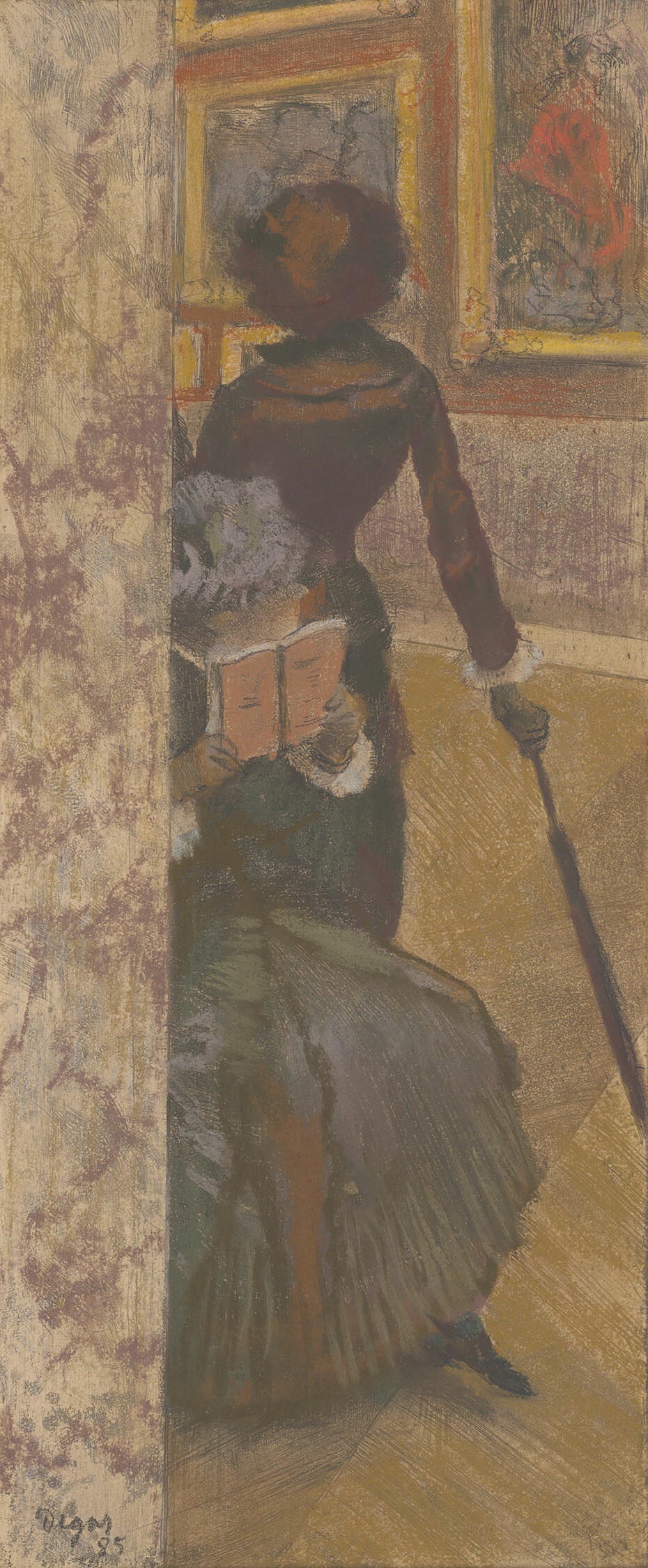
Edgar Degas:
Mary Cassatt at the Louvre: The Paintings Gallery
(1885)
I Wonder What Insufficiency Buys Me
In my seemingly endless search for sufficiency, I do not always notice just how extraordinary I might already be. I may have been too focused on improvement to muster a decent acceptance that how, what, or who I was might have surprisingly qualified as plenty, as enough. Our culture seems obsessed with pursuing continuous improvement, which amounts to a self-image of continual inadequacy. Who would hope to be presently inadequate so they might find themselves improved later? If we're not quite ourselves yet, who was supposed to pursue the aspired for improvement? We can deny that we're adequate, but what do my convictions of insufficiency buy me, really?
RichLife
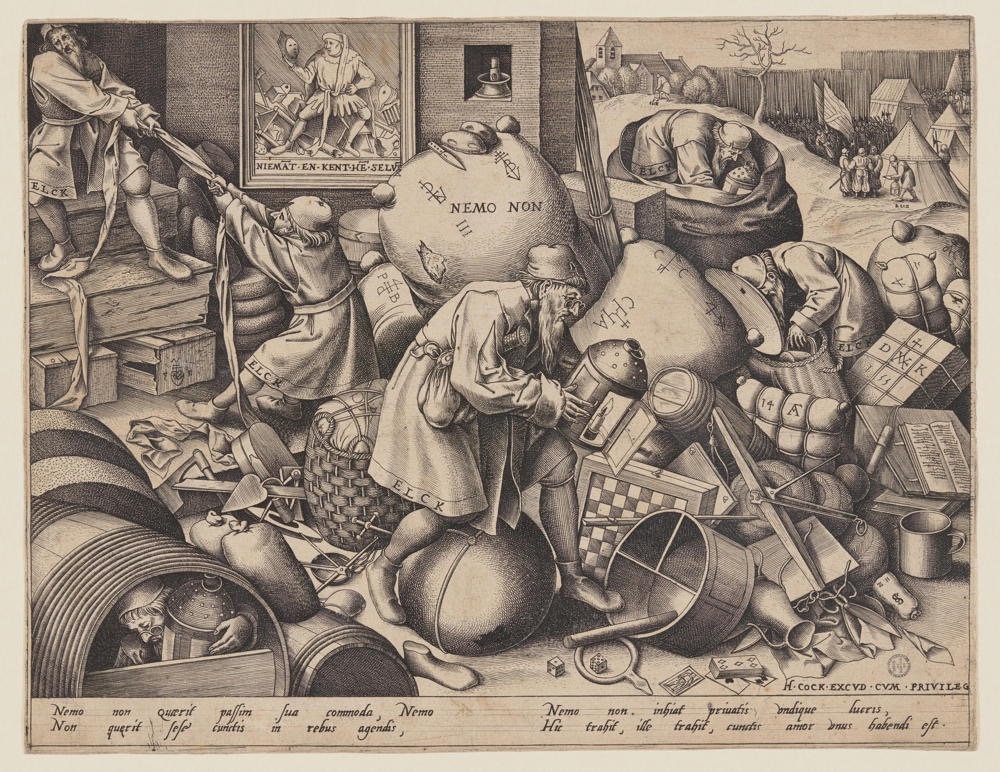
Pieter van der Heyden:
"Nemo Non” (Every man looks for his own profit) (c. 1563)
"I missed him before he left."
I received word that my dear friend Rich VanHorn died. He had been under hospice care since his physicians had released him from treatment two months before after eight months of effort to cure what started as a case of stage four lung cancer, which had migrated into his brain. He began treatment just as The Muse ended her immunotherapy response to early-stage throat cancer, with every expectation of a full recovery since he was an atypical patient. Never having smoked, the source of his cancer seemed mysterious, and he had access to one of the best clinics in the world. Initial responses seemed promising, but the cancer continued spreading until his doctors advised that he stop chasing a cure. He settled into that news with circumspection as if this phase of the disease had been sent to teach him something.
Rich took his undergraduate degree from Columbia Divinity, graduating into a position in the fabled Western Electric Human Resources Department in New Jersey.
Overreaching
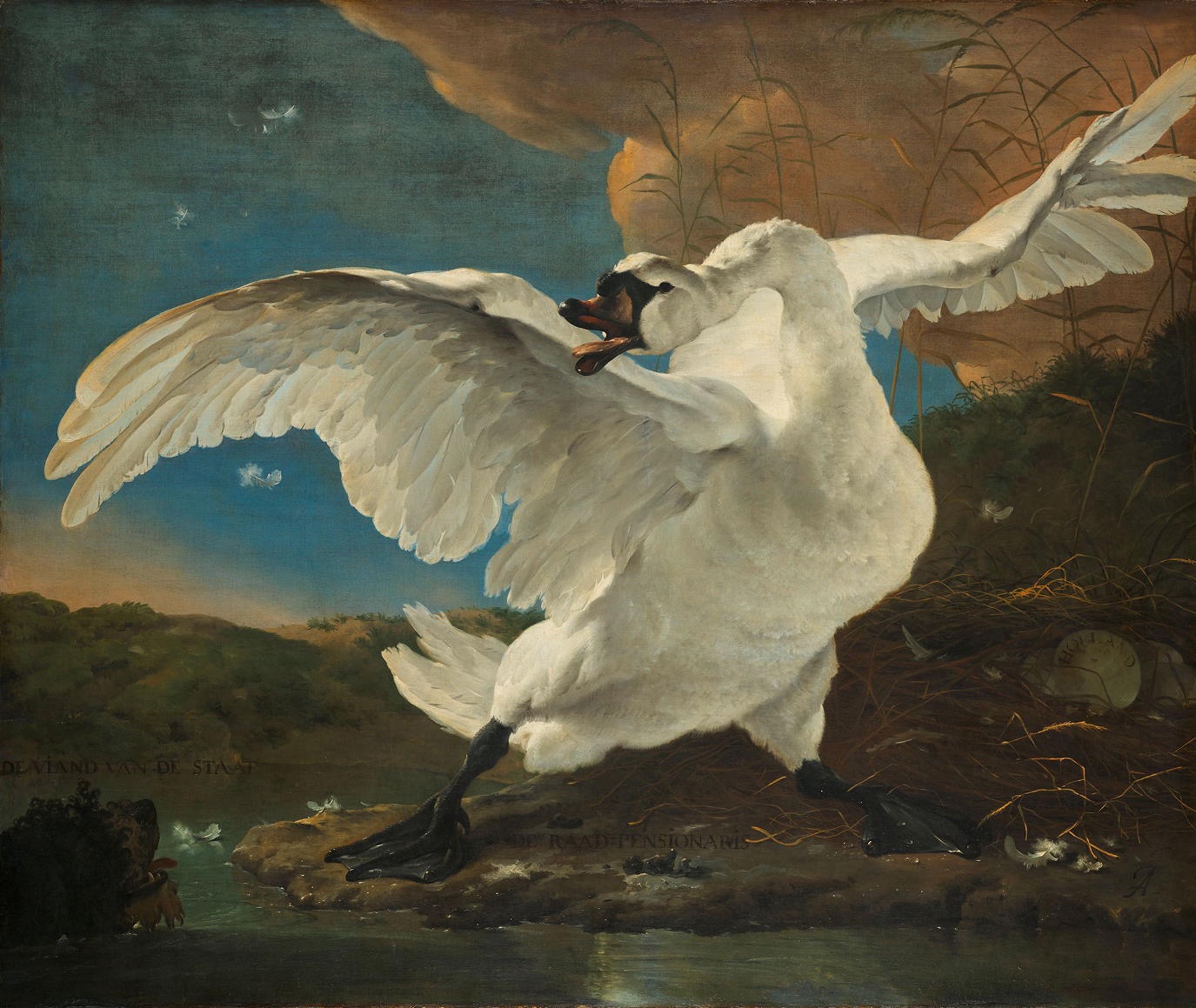
Jan Asselijn: The Threatened Swan (c. 1650)
"We were supposed to be better than this."
It seems to be in our human nature to Overreach. We tend to take some stand and then over-play our hand, undermining our intentions. Moderation might be the only reasonable cure, but since when did moderation come into play when anyone engages with passion? And we revere the passion over-playing our hand induces, for then the complex world reduces into a single blinding right outshining almost every other wrong. To find myself on the side of not just right but righteousness invigorates me in ways I cannot deny and dare not avoid. Such passion might be the right that can only go wrong, but one we willingly embrace and with which we feel especially blessed. Save us from such righteousness.
Our enemies tend to be invisibly passionate, just as we tend to be, too.
Portending
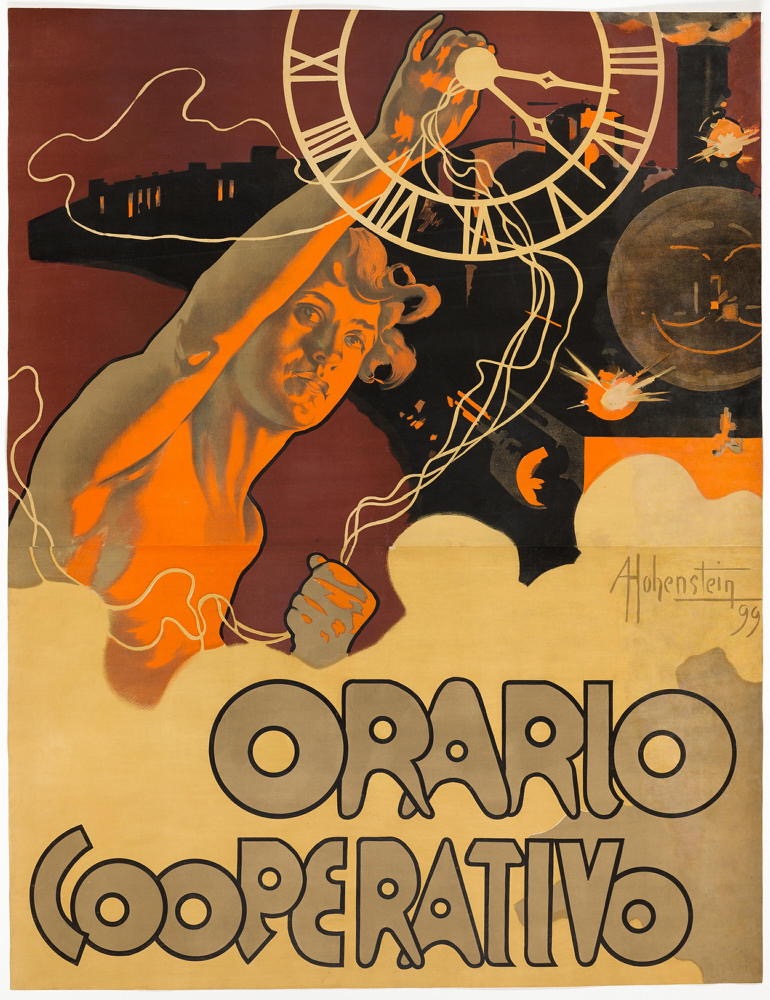
Adolf Hohenstein: Time Cooperative (1899)
" … giving my existence special meaning here."
As a dedicated fantasist, I can see anything in almost anything; everything's an omen of something. For instance, while driving home yesterday, the Schooner's rear driver's side tire went flat. Flat tires have become genuinely rare occurrences. I can't remember experiencing one since I was in my twenties, maybe fifty years ago. I'd known that the tires were getting near when they'd need replacing, but, as usual, I was stretching as much life as I could get out of them. The perfect tire seems to be the one that has less than a mile of useful life left in it when it's replaced. I'd found the one weak sister among the four and driven too far.
I pulled into a handy farmer's field to change the tire, an experience which I expected to become an ordeal but which I easily completed
PacingMyself
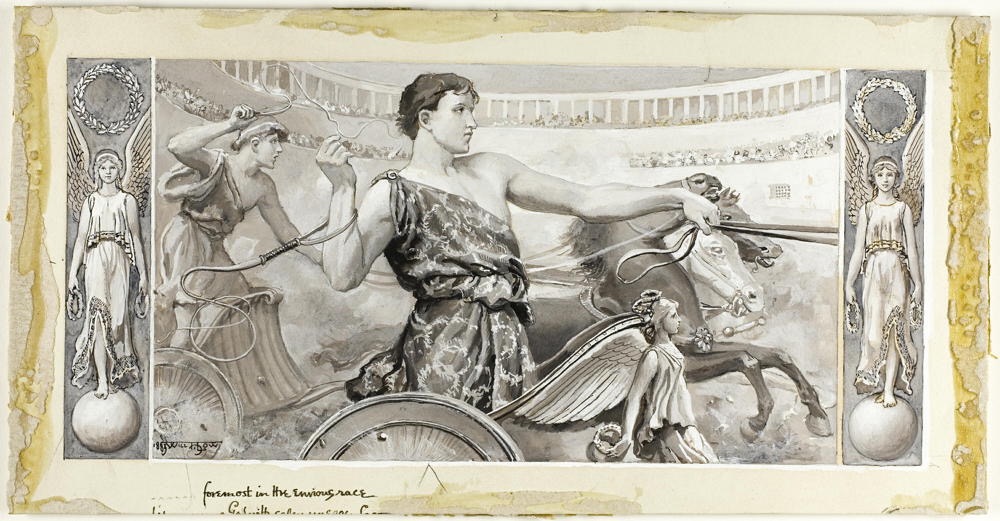
Will Hicock Low:
Foremost in the Envious Race (1885)
" … Traveling hopefully, if never fully arriving."
I never was exceptionally skilled at PacingMyself. My eyes have always been bigger than my stomach, my aspirations greater than my capabilities. These tendencies combine to render me a much better dreamer than a manifester. As a writer, dreaming might be indistinguishable from manifesting, so I might have chosen my profession well. However, I suspect that my work chose me rather than the other way around. However I've found my way here, I am well familiar with exceeding my limits, with hurting myself. I expect more of myself than later seems reasonable, and I suspect I remain relatively immature in that respect. I might have imagined learning over time more precisely where my limits lie, but I have failed to assimilate this sort of knowledge.
Fortunately for me, my subconscious tends to be watching out for me.
Celebrity

Ben Shahn: Sideshows at the Ashville,
July 4th celebration, Ashville, Ohio (1938)
" … providing the forehead The Muse uses to bounce her hair-brained ideas off of …"
The Muse's campaign to become elected Port Commissioner has already turned her into a local Celebrity. She's forever running into somebody she knows. It seems wherever she goes now, her reputation preceded her arrival. She's also taken to dropping names, not to show off, but to ascribe stories. Most of the names I do not recognize, but I understand that they mainly belong to those who already joined the ranks of the locally famous: leaders of various colors, executive directors, movers, as well as shakers. She was apparently inducted into that company, if only due to her audacity. She lost whatever anonymity she ever possessed when she started making a name for herself. Whether she was born a leader doesn't much matter. She now has many followers.
I have taken to introducing myself as The Muse's Arm Candy.
MerelyHuman
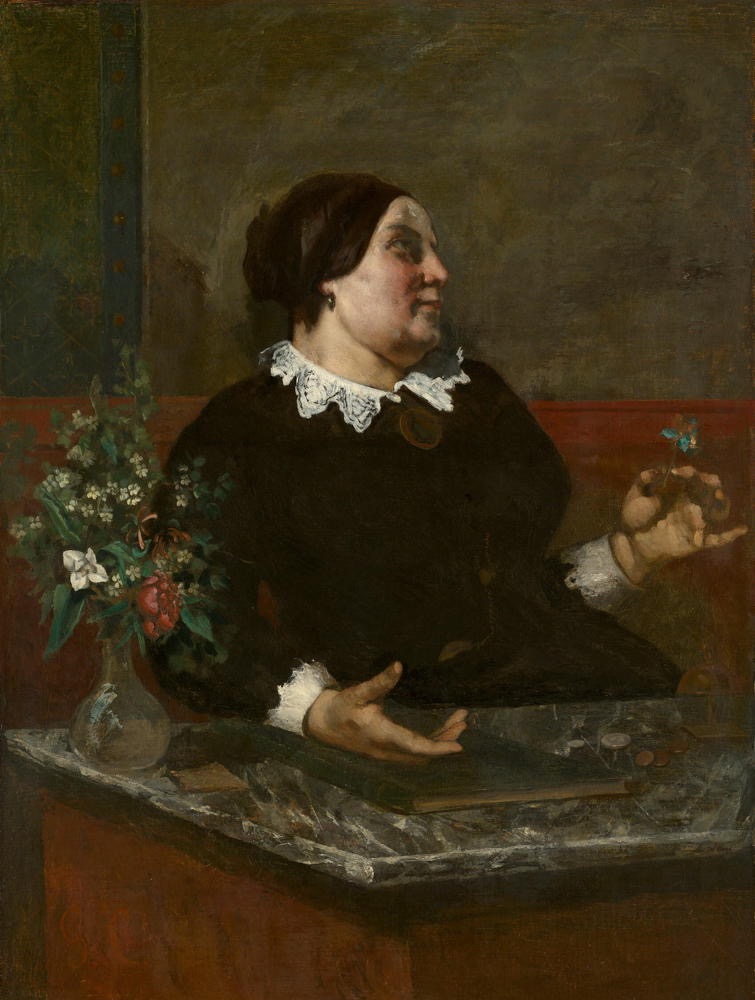
Gustave Courbet: Mère Grégoire (1855 and 1857/59)
" … the questionable superpower that comes from wearing Spandex®"
Like it or not, we live in a world that worships the superhuman rather than the more ordinary kind. Half the movies produced these days feature characters sporting so-called superpowers, capabilities no mere human ever possessed. These powers tend to be of limited utility, seemingly most often centered around fistfighting, for the villains in these films seem to be stuck in some pugilistic past where might makes right rather than in a more believable future where the bulk of the actual action occurs in firmware. The Spandex® suits suit few physiques, too, since few benefit from a costume that might just as well have been painted on. A more cultured hero might prefer to sport pleats and the occasional pattern rather than the uni-color jumpsuit with the obligatory logo.
Much of my life has been spent in the shadow of one or another superhero.
CrowdingOut
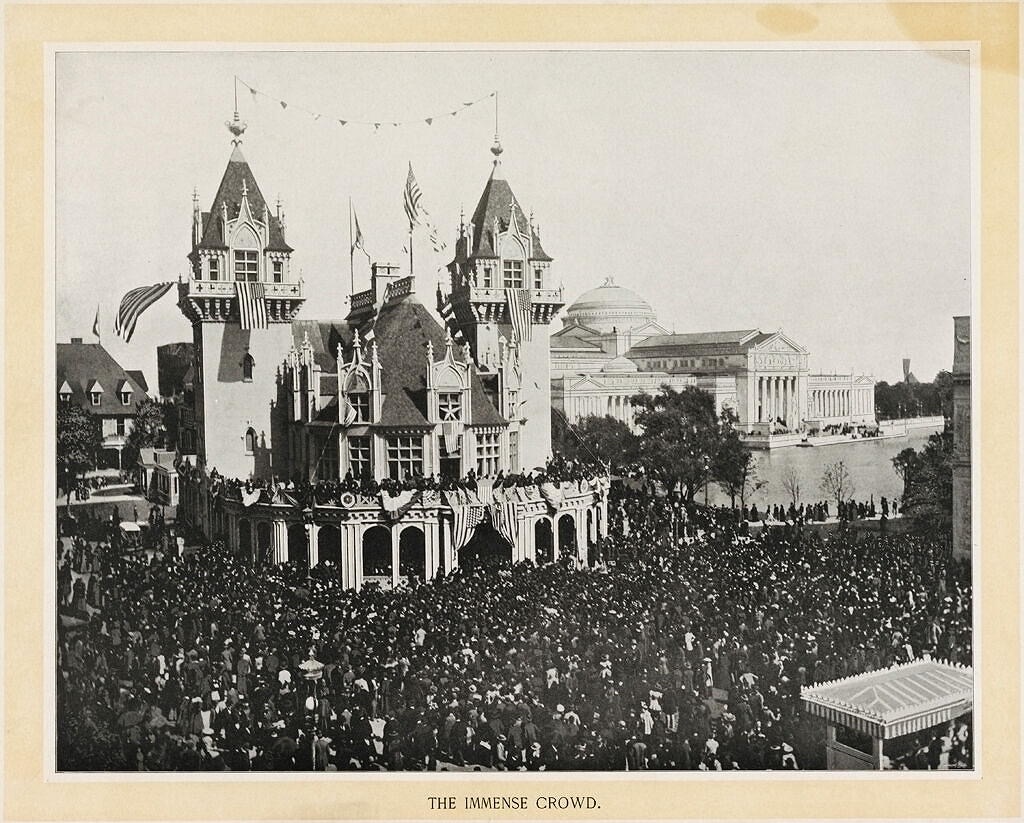
William Henry Jackson,
The Immense Crowd, World's Columbian Exposition (1894)
"Even the CrowdingOut gets crowded out sometimes."
I hesitated when The Muse asked me to sign on as her campaign manager. Truth told I'd advised her not to run, but she went right ahead and ran anyway. To enlist someone who demonstrated their dedication to the effort the way I had bound me up, though I eventually relented. However, I did so, still clinging to my original misgivings. It wasn't that I didn't want to support her in this latest delusion. I was more trying to avoid colluding with myself against my own best interests. I avoid making too many commitments because I fear I will, by default, be CrowdingOut more critical stuff. I can never tell what that stuff might entail, but I keep my schedule more to the wide-open end of the scale than the slammed-shut side. Most importantly, I strongly need to protect my sacred writing time because I know how vulnerable that can become.
Writing fails exclusively through sins of omission rather than by commission.
WritingSummary For The Week Ending 10/05/2023
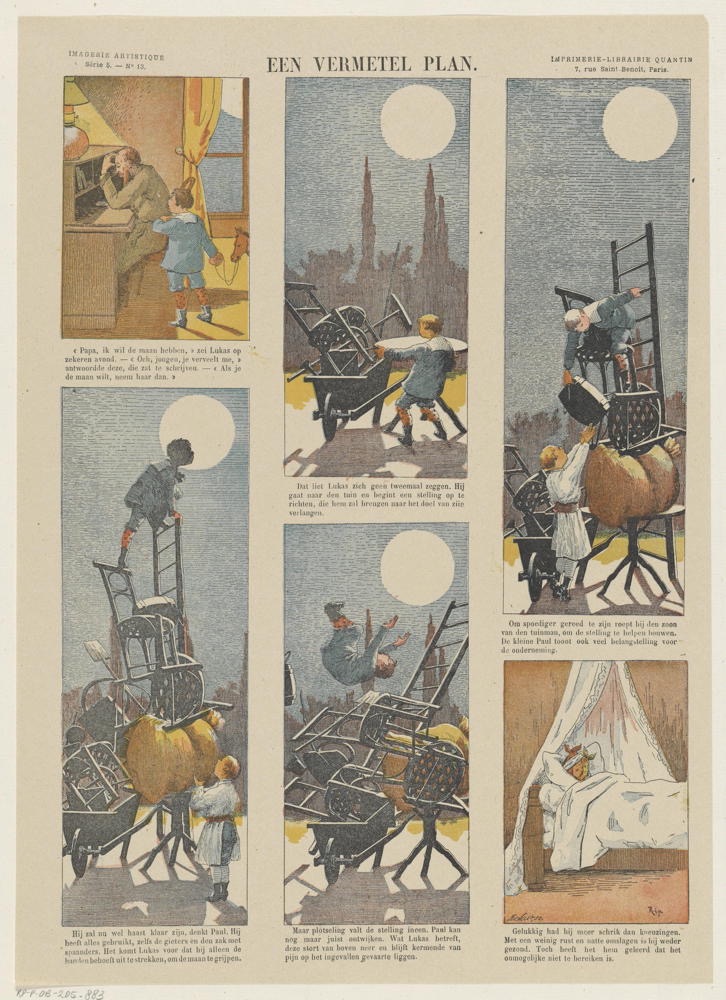
Michelet: Een vermetel plan [An Audacious Plan](1888)
Careful Whatever I Wish For
My side work profoundly influenced this writing week, my day job mismanaging The Muse's political campaign. In that work, I found insight into what I might have been attempting in my real job, this story-writing occupation that only pays me in satisfaction. I watched myself meandering yet still making progress. I caught myself exhausting myself, too, and wondered who taught me to be so damned self-sacrificial. I suspect my loving parents taught me how to deeply wound myself because theirs had taught them the same lesson learned in the heartless heart of The Great Depression. Intergenerational self-destruction in pursuit of survival, perhaps even success, seems like a worthy inheritance. It seems pleasingly paradoxical yet stunningly familiar, an audacious solution for a common problem. I must be careful whatever I wish for because I can hurt myself in any pursuit.
PreparationDance
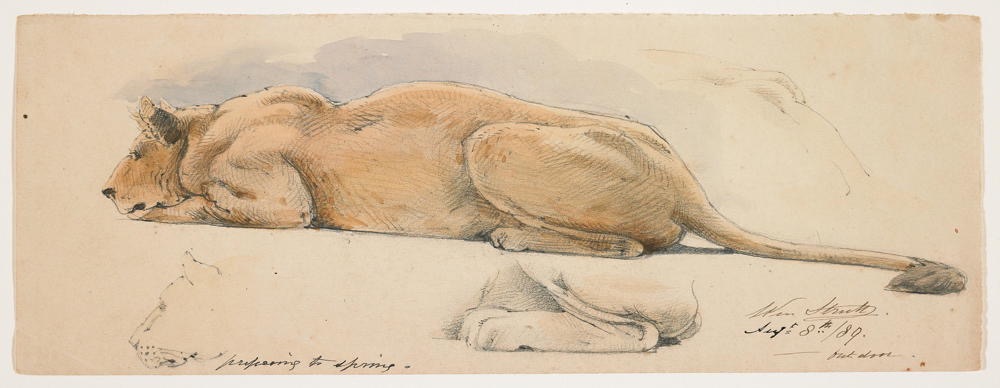
William Strutt: A Lioness Preparing to Spring (August 8, 1889)
"Appearing genuine requires much preparation."
The week leading up to The Muse's first public debate in her Port Commissioner campaign featured what might be labeled her PreperationDance. Intricate and filled with significance, this dance involves about as much ritual as invention, along with ample idle periods. She remains focused in story, if not necessarily in practice. She begs off almost every invitation, explaining that she's in the middle of preparation. There's no successful arguing against her assertion, for she's maintaining a laser-like focus on the prize. She will make up through repetitive practice whatever she lacks in raw talent. She will leave little to chance.
I first noticed the dance when I heard rattling and commotion coming from our almost unused front upstairs room.
Exhausted

Rembrandt van Rijn: The Rest on the Flight into Egypt (c. 1644)
" … much better off just staying away from engaging."
Exhaustion might be the most dangerous of the human conditions, for those experiencing it lose their ability to recognize its presence and influence. Judgment typically goes to Hell, while once trustworthy intuition fails. Because of these and other ramifications, it's considered best just to avoid exhaustion. This probably means expending significantly less than one hundred percent of one's energy in any single instance to maintain some reserve and preserve some semblance of balance. For over-achievers, this moderation might feel indistinguishable from slacking and appear to observers as an absence of requisite dedication, as if one really should be killing themselves to show their deep commitment. The perfectly human tendency to turn even innocent activities into internal competitions only exacerbates this difficulty because competing further inhibits sensitivity. We willingly kill ourselves, often exuberantly!
We wash up on desolate beaches after falling overboard.
Amounting

Ridolfo Ghirlandaio: Portrait of a Gentleman (c. 1505)
" … we might misattribute to ourselves."
I've taken to totting up my Canvassing efforts once I return to The Villa. So far, I've yet to cover neighborhoods too distant, all well within walking distance, but Canvassing distances differ surprisingly from any straight-line ones. I have yet to discover the conversion factor, and I might not. I just understand that the differences seem significant. On the first day out, I ranged up to two blocks from our front door yet still managed to clock nearly four miles when counting steps. Don't worry, I'm not nearly anal enough to actually count my steps, but The Muse reminded me that my iPhone has an App that cannot be turned off, which surreptitiously counts steps. Finding a website dedicated to translating step counts into distances, insignificant increments into numbers that actually seem to amount to something was a simple matter. Five days in, I broke over twenty miles marched, and that's only counting two precincts!
I've noticed before that progress comes exclusively in InsignificantIncrements.
CottageIndustry

Helen Allingham: A Wiltshire Cottage (19th-20th century)
While Vincent van Gogh was developing as an artist by studying English illustrated journals, he was struck by Paterson's work in The Graphic. Although females could not gain the same recognition as men at the time, Helen Allingham was one of the women artists who made a considerable impact, as she influenced artists like Van Gogh. -Wikipedia
—
" … on legs that vividly remember stumbling."
Processes, how people accomplish things, have long fascinated me. By my own admission, I have been mainly critical of "process," if only because I felt that organizations generally took the notion too literally. They'd pose then enforce strict rules as if only those could produce such curious results as consistency, most often still the hobgoblin of the weaker minds. They'd likewise strive for other attributes perhaps only suitable for large-scale industrial processes, applying these to wildly different contexts. In these ways and many others, managers would subvert the actual benefits of processes by strictly enforcing some naive notions about what constituted them. Popular method-ologies (method descriptions raised to religious veneration) further degraded the intention, as successive generations were trained to interpret their processes in this primitive manner, as if that result represented progress.
We've seen the effect of processes run amok in just these ways, most disturbingly within CottageIndustry.
TakingAHike

Jan Lauwryn Krafft (I): Wandelaar [Hiker] 1704 - 1765
"I'm in a kind of walking coma …"
I didn't know what I might be called upon to do when The Muse insisted I agree to become her Campaign Manager for her run to be elected Port Commissioner. I only knew that I didn't want any part of the scheme, for it seemed to be another one of those plans to bring me out into more actively engaging outside my head, a make-work arrangement intended to force me to do things I never intended to do. And to some extent, all my suspicions turned out to be true. As I've mentioned in previous stories, I've renamed my role Campaign MISmanager, if only because that title better describes the value proposition her campaign has received from my presence. Still, I've had my moments. I have contributed some value.
I'm now engaged in my new hobby: Canvassing, an obligation transformed into a personal competition.


